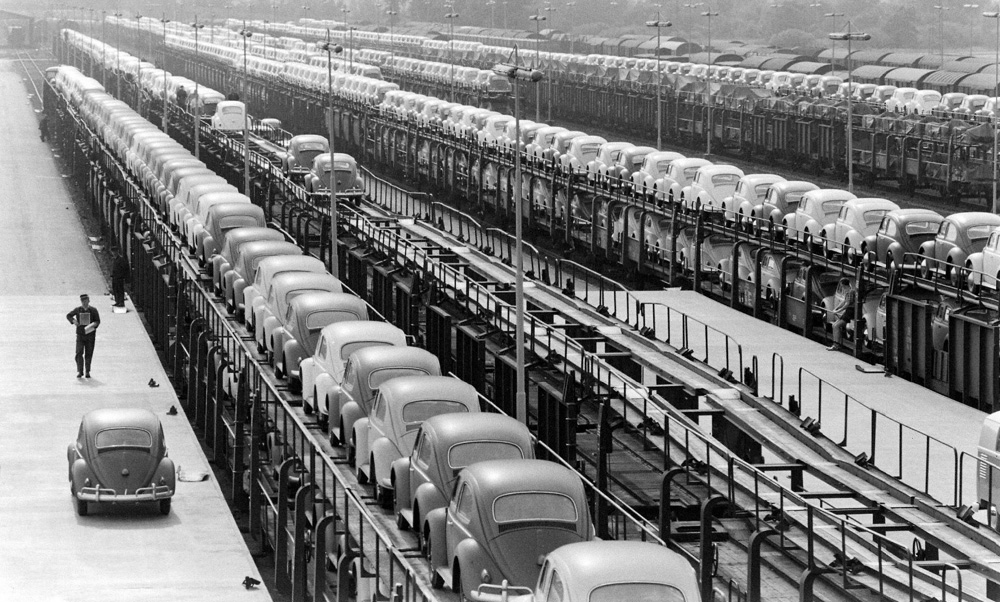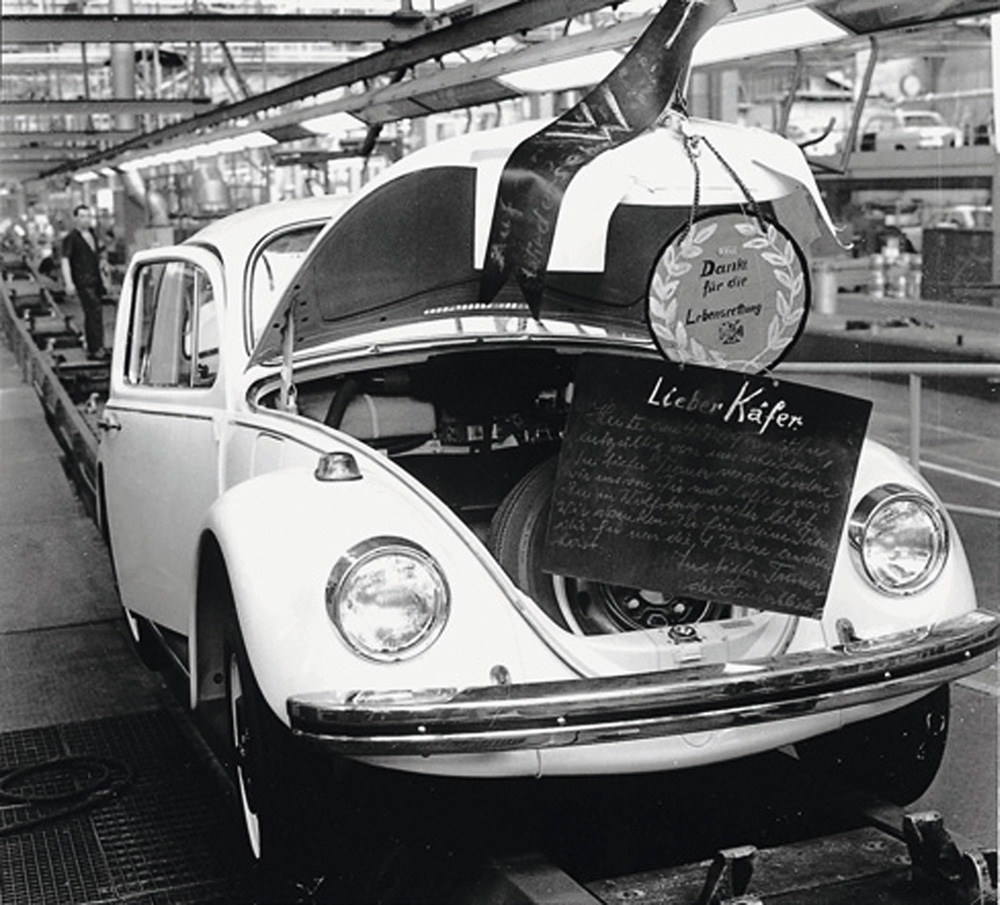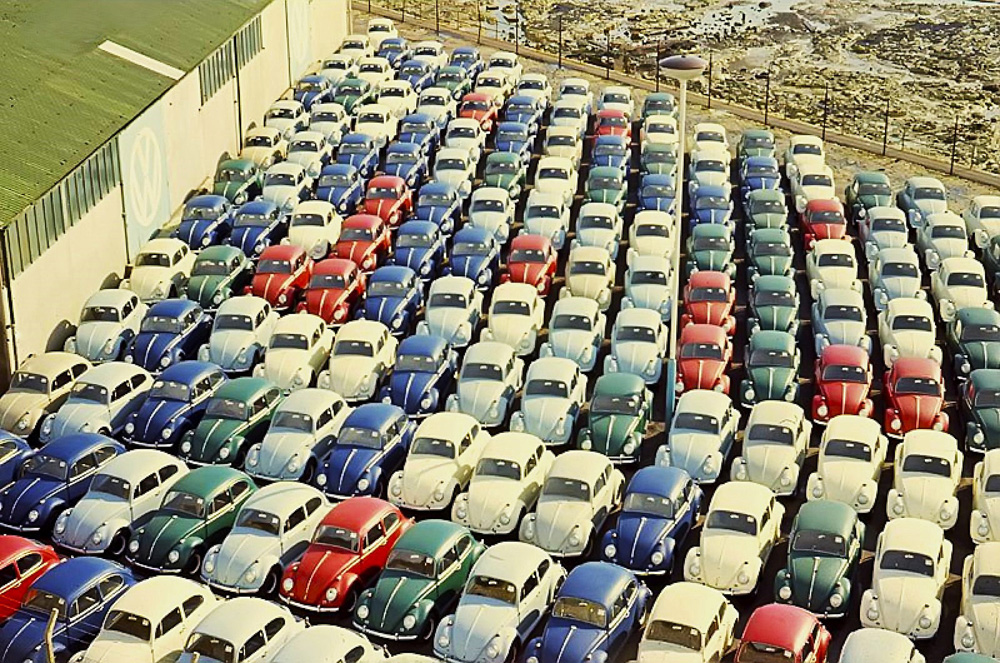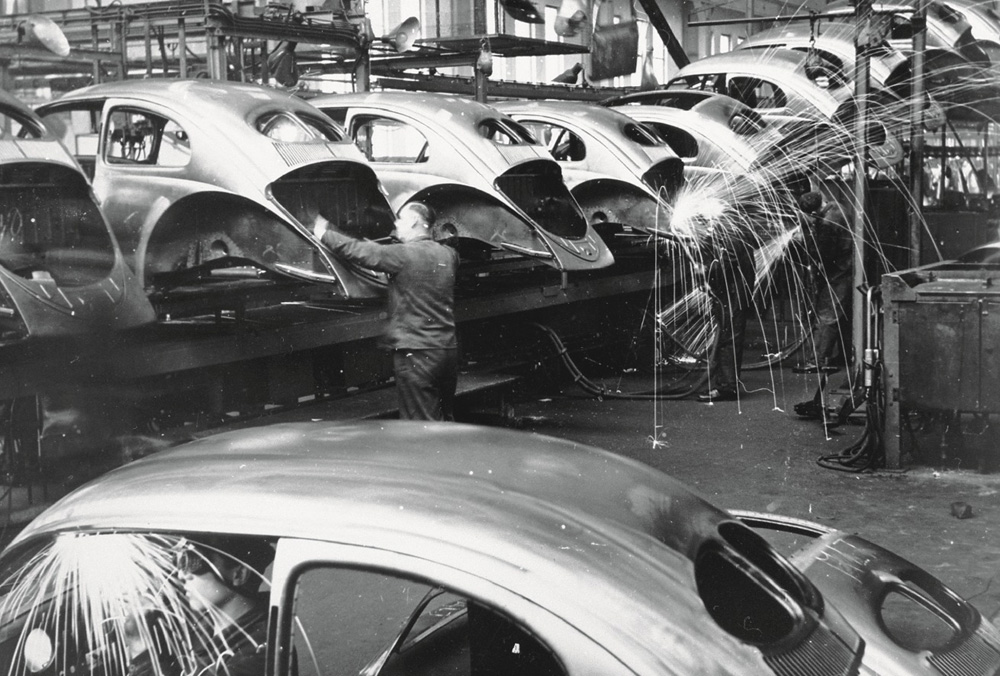
Join our AllAirCooled VWs Facebook group to connect with other Vintage VW enthusiasts!
 Beetle
bodyshells are transported on a chain conveyor to the paint line at Volkswagen
Emden in the late 1960s. At this time 1,000 cars a day were being produced
at the plant. Image courtesy of Volkswagen Emden Corporate Communications.
Beetle
bodyshells are transported on a chain conveyor to the paint line at Volkswagen
Emden in the late 1960s. At this time 1,000 cars a day were being produced
at the plant. Image courtesy of Volkswagen Emden Corporate Communications.
 Several trains loaded with new Volkswagens await departure at the Verladebahnhof
train loading depot on the north side of the Volkswagen factory in Wolfsburg
in the late 1950s
Several trains loaded with new Volkswagens await departure at the Verladebahnhof
train loading depot on the north side of the Volkswagen factory in Wolfsburg
in the late 1950s
 The
last Beetle that was made by the Audi factory in Ingolstadt, Germany.
The round sign says "Thank you for saving our life". The Beetle
gave work to the employees in the Bavarian city, keeping them afloat while
new Audi models were being developed
The
last Beetle that was made by the Audi factory in Ingolstadt, Germany.
The round sign says "Thank you for saving our life". The Beetle
gave work to the employees in the Bavarian city, keeping them afloat while
new Audi models were being developed
 The
new vehicle departure yard at the port of Ramsgate in Kent, southeast
England, in 1965, full of right-hand drive Volkswagens
The
new vehicle departure yard at the port of Ramsgate in Kent, southeast
England, in 1965, full of right-hand drive Volkswagens
 Swedish
cargo ship MS Clary Thordén is pictured loading Volkswagen Beetles
and Type 2 Barndoor Transporters from Deutsche Bundesbahn rail wagons
at a snow-covered West German port during early 1955
Swedish
cargo ship MS Clary Thordén is pictured loading Volkswagen Beetles
and Type 2 Barndoor Transporters from Deutsche Bundesbahn rail wagons
at a snow-covered West German port during early 1955
 A long line of Volkswagen Type 3 1500 models get a final inspection and
a window clean under the bright lights of the final assembly hall at Wolfsburg
sometime between introduction in 1961 and mid-1964
A long line of Volkswagen Type 3 1500 models get a final inspection and
a window clean under the bright lights of the final assembly hall at Wolfsburg
sometime between introduction in 1961 and mid-1964
 New
T2 Transporters being converted into campers at the Dormobile factory
in Folkstone, Kent, on the south-east coast of England. The first VW-based
Dormobiles appeared in 1961 and the company still sell motor homes based
on the VW Transporter today
New
T2 Transporters being converted into campers at the Dormobile factory
in Folkstone, Kent, on the south-east coast of England. The first VW-based
Dormobiles appeared in 1961 and the company still sell motor homes based
on the VW Transporter today
 Transporter
body assembly at Volkswagenwerk Hannover
Transporter
body assembly at Volkswagenwerk Hannover
 A
colourful scene with two special limited edition Jeans Beetles in the
final assembly hall of either Volkswagen Wolfsburg, or possibly at Volkswagen
Brussels which were the two factories that produced this edition for the
1974 model year
A
colourful scene with two special limited edition Jeans Beetles in the
final assembly hall of either Volkswagen Wolfsburg, or possibly at Volkswagen
Brussels which were the two factories that produced this edition for the
1974 model year
 Sparks
fly as Beetle bodyshells mounted transversely on a transfer line are welded
by hand at the front and rear in 1952
Sparks
fly as Beetle bodyshells mounted transversely on a transfer line are welded
by hand at the front and rear in 1952
Images courtesy of Volkswagen Factory Pictures